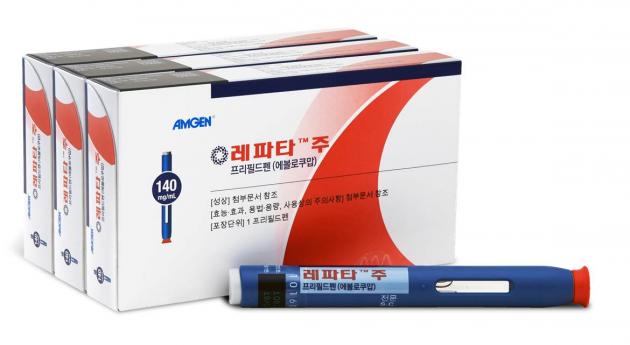Amgen Korea암젠코리아 has released Repatha (component: evolocumab), a treatment for homozygous familial hypercholesterolemia, a genetic disorder characterized by high cholesterol levels in the blood.
Homozygous familial hypercholesterolemia (HoFH) is a rare hereditary endocrine disorder that occurs in about one in a million people in the world. Mutations take place in both pairs of LDL receptor genes that absorb low-density lipoprotein cholesterol (LDL-C) in the blood.
HoFH patients show a four-times higher LDL-C level than others, which is highly likely to cause early cardiovascular disease. Many patients are known to experience clinically significant coronary heart disease before the age of 30. The most characteristic symptom of HoFH is the crystalline yellow color on their skin that appears before 10 years old.
Repatha is the only PCSK9 inhibitor in Korea with indications for HoFH therapy. It is a human monoclonal antibody that inhibits binding of LDL receptors to 1, subtilisin/kexin type 9, and PCSK9. The interaction of Lepta with PCSK9 allows more LDL receptors to eliminate blood LDL-C, known as “bad cholesterol.”

Repatha can be used in combination with other lipid-lowering agents (statins, ezetimibe, lipid separation, and extraction, etc.) for people with HoFH aged 12 years or older.
The TESLA-Part B clinical trial was a double-blind, placebo-controlled, phase 3 test in 49 HoFH patients aged 12 and older. The primary endpoint of the study was the mean percentage change in LDL-C levels from baseline at week 12 of treatment; patients were assigned to 2:1 ratio combination therapy with Repatha and other lipid lowering agents and with conventional therapy.
As a result, Repatha-treated patients showed the improved LDL-C-lowering effect of about 31 percent compared to conventional treatments.
"Until recently, HoFH wasn’t even diagnosed correctly,” said Rho Sang-kyung노상경, CEO of Amgen Korea. “I am pleased to be able to provide effective treatments for HoFH patients who are living with increased risk of cardiovascular disease and sudden death from childhood, through the innovative new drug.”
Amgen, which has developed its research capacity in heart disease for more than 10 years, will continue to try to resolve the unmet needs of patients with the high-risk cardiovascular disease, Rho added.

